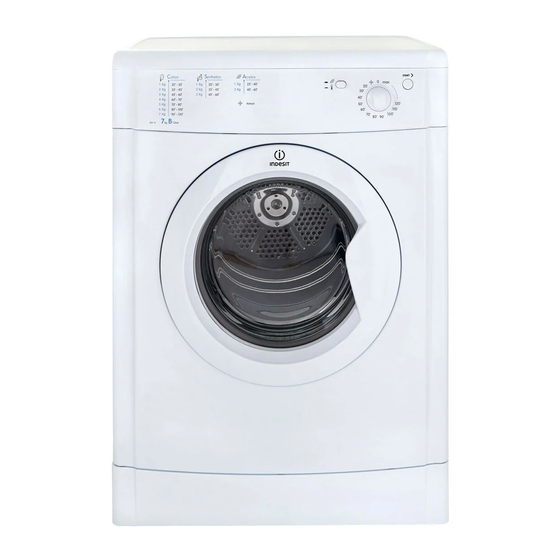Indesit IDV 75 Manual de instruções - Página 2
Procurar online ou descarregar pdf Manual de instruções para Secador Indesit IDV 75. Indesit IDV 75 16 páginas.
Também para Indesit IDV 75: Manual (16 páginas)

Installation
Where to install the tumble dryer
EN
• Install the dryer far from gas
ranges, stoves, radiators or hobs,
as flames may damage it.
If the dryer is installed below a
worktop, ensure there are 10 mm
between the upper panel of the
dryer and any objects above it,
and 15 mm between the sides
of the machine and the walls or
furniture units adjacent to it. This
ensures adequate air circulation.
Make sure the air inlets on the rear panel are not blocked or
obstructed.
• You should also make sure that the room in which
the tumble dryer is installed is not damp, and that it is
adequately ventilated.
• ! We do not recommend that the dryer is installed in a
cupboard but the dryer must never be installed behind a
lockable door, a sliding door or a door with a hinge on the
opposite side to that of the dryer door.
Ventilation
This appliance gently dries laundry by taking in cold, clean and
relatively dry air, heating it and passing it through the fabric. To
facilitate the drying process, damp air is expelled at the rear,
through a ventilation hose. When the dryer is in use, there has
to be adequate ventilation to avoid a back flow of gases into
the room from appliances burning other fuels, including open
fires.
Mobile ventilation system
When using the tumble dryer with the mobile ventilation
system, a ventilation hose must be connected. The hose
should be securely fastened to the ventilation hole at the
rear of the appliance (see "Description of the tumble dryer").
We recommend the hose is connected to an outlet near
the tumble dryer, if possible. If it cannot be installed in a
permanent spot, the tumble dryer will still function perfectly
well if the ventilation hose is passed through a partially-
opened window.
! Make sure you do not point the ventilation hose towards the
air inlet, which is located on the rear of the appliance.
! The ventilation hose should not exceed a maximum length of
2.4 metres; it should also be shaken frequently to remove any
fluff, dust or water deposits inside it. Make sure you do not
crush the hose.
Fixed ventilation system
We recommend the ventilation hose is connected to a
ventilation system for windows or doors, available from the
retailer which originally sold you the appliance or from your
local spare parts stockist.
2
15 mm
15 mm
15 mm
15 mm
Wall ventilation hole
B
1. Leave an opening in the wall
to the left of the tumble dryer
installation site.
short and straight as possible,
in order to prevent any moisture
from condensing and leaking
A
back into the appliance.
must also be straight and pointing downwards, so that the
flow of air coming out is not impeded.
Areas A and B should be checked frequently, to prevent
the accumulation of fluff or debris, particularly if the tumble
dryer is used very often. The hose adaptor must be fitted
correctly, in order to prevent damp air from coming back into
the room.
Window ventilation hole
The ventilation hole should
be directly behind the dryer in
order to keep the hose as short
as possible.
! Make sure you do not
push the tumble dryer too
far backwards, as this could
lead to the ventilation hose
being crushed, bent or even
disconnected.
! There should be no cuts, kinks or "U"-shaped bends
in the hose, as these could impede ventilation or trap
condensation.
Ventilation through an open window
The end of the hose must be
facing downwards, in order to
prevent the hot, damp air from
forming condensation in the
room or the tumble dryer.
! Make sure that the tumble dryer is adequately ventilated,
and that the end of the ventilation hose is not pointing
towards the air inlet pipe on the rear of the appliance.
! The ventilation hose must always be fitted to ensure
optimum performance.
! Make sure that the ventilation hose and the air inlet vents
are not obstructed or blocked.
! Do not let the tumble dryer recirculate exhaust air.
! Improper use of the tumble dryer may result in fire hazards.
! The air emitted by the tumble dryer must not be expelled in
the same duct as used for the fumes produced by different
appliances which burn gas or other fuels.
! Do not discharge the exhaust air into an extraction system
or any duct with an extractor fan. This will affect the way the
thermal controls operate and can result in a fire hazard.
2. Make the hose as
3. The hole in the wall
